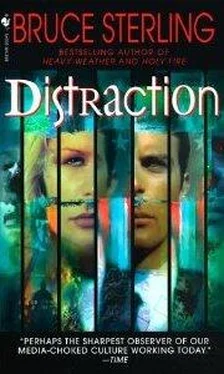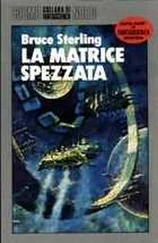“And what will that bring us — your brand-new Cognition Age?”
“Nobody knows. If we knew what the outcome would be in advance, then it wouldn’t be basic research.”
Oscar blinked. “Let me get this straight. You’re dedicating your life to neural research, but you can’t tell us what it will do to us?”
“I can’t know. There’s no way to judge. Society is too complex a phenomenon, even science is too complex. We’ve just learned so in-credibly much in the past hundred years… Knowledge gets frag-mented and ultraspecialized, scientists know more and more about less and less… You can’t make informed decisions about the social results of scientific advances. We scientists don’t even really know what we know anymore.”
“That’s pretty frank, all right. You’re frankly abandoning the field, and leaving science policy decisions to the random guesses of bureaucrats.”
“Random guesses don’t work either.”
Oscar rubbed his chin. “That sounds bad. Really bad. It sounds hopeless.”
“Then maybe I’m painting too dark a picture. There’s a lot of life in science — we’ve made some major historic discoveries, even in the past ten years.”
“Name some for me,” Oscar said.
“Well, we now know that eighty percent of the earth’s biomass is subterranean. ”
Oscar shrugged. “Okay.”
“We know there’s bacterial life in interstellar space,” Greta said. “You have to admit that was big.”
“Sure. ”
“There have been huge medical advances in this century. We’ve defeated most cancers. We cured AIDS. We can treat pseudo-estrogen damage,” Greta said. “We have one-shot cures for cocaine and heroin addiction.”
“Too bad about alcoholism, though.”
“We can regenerate damaged nerves. We’ve got lab rats smarter than dogs now.”
“Oh, and of course there’s cosmological torque,” Oscar said. They both laughed. It seemed impossible that they could have overlooked cosmological torque, even for an instant.
“Let me switch perspectives,” Oscar said. “Tell me about the Collaboratory. What’s your core competency here in Buna — what does this facility do for America that is unique and irreplaceable?”
“Well, there’s our genetic archives, of course. That’s what we’re world-famous for.”
“Hmmm,” Oscar said. “I recognize that gathering all those spec-imens from all around the world was very difficult and expensive. But with modern techniques, couldn’t you duplicate those genes and store them almost anywhere?”
“But this is the logical place for them. We have the genetic safety vaults. And the giant safety dome.”
“Do you really need a safety dome? Genetic engineering is safe and simple nowadays.”
“Well, sure, but if America ever needs a Class IV biowar facility, we’ve got one right here.” Greta stopped. “And we have first-class agricultural facilities. A lot of crop research goes on here. Overclass people still eat crops. They love our rare animals, too.”
“Rich people eat natural crops,” Oscar said.
“Our biotech research has built whole new industries,” Greta insisted. “Look at what we’ve done to transform Louisiana.”
“Yeah,” Oscar said. “Do you think I should emphasize that in the Senate hearings?”
Greta looked glum.
Oscar nodded. “Let me level with you, Greta, just like you did with me. Let me tell you about the reception you might expect in today’s Congress. The country’s broke, and your administrative costs are through the roof You have well over two thousand people on the federal payroll here. You don’t generate any revenue yourselves — out-side of winning the favor of passing celebrities with nice gifts of fluffy rare animals. You have no major military or national security interests. The biotech revolution is a long-established fact now, it’s not cutting edge anymore, it’s become a standard industry. So what have you done for us lately?”
“We’re protecting and securing the planet’s natural heritage,” Greta said. “We’re conservationists.”
“Come on. You’re genetic engineers, you have nothing to do with ‘nature.’ ”
“Senator Dougal never seemed to mind a steady flow of federal funds into Texas. We always have state support from the Texas delega-tion. ”
“Dougal is history,” Oscar said. “You know how many cyclo-trons the U.S. used to have?”
“ ‘Cyclotrons’?” Greta said.
“Particle accelerator, a kind of primitive, giant klystron,” Oscar said. “They were huge, expensive, prestigious federal laboratories, and they’re all long gone. I’d like to fight for this place, but we need compelling reasons. We need sound bites that the layman can under-stand. ”
“What can I tell you? We’re not PR experts. We’re only mere, lowly scientists.”
“You’ve got to give me something, Greta. You can’t expect to survive on sheer bureaucratic inertia. You have to make a public case.”
She thought about it seriously. “Knowledge is inherently pre-cious even if you can’t sell it,” Greta said. “Even if you can’t use it. Knowledge is an absolute good. The search for truth is vital. It’s cen-tral to civilization. You need knowledge even when your economy and government are absolutely shot to hell.”
Oscar thought it over. “ ‘Knowledge will get you through times of no money better than money will get you through times of no knowledge.’ You know, there might be something to that. I like the sound of it. That’s very contemporary rhetoric.”
“The feds have to support us, because if they don’t, Huey will! Green Huey understands this place, he knows what we do here. Huey will get us by default.”
“I appreciate that point too,” Oscar said.
“At least we earn a living out of this mess,” Greta said. “You can always call it a job-creation effort. Maybe you could declare us all insane and say that labwork is our group therapy. Maybe you could declare the place a national park!”
“Now you’re really brainstorming,” Oscar said, pleased. “That’s very good.”
“What’s in this for you?” Greta said suddenly.
“That’s a fair question.” Oscar smiled winningly. “Let’s just say that since meeting you I’ve been won over.”
Greta stared. “Surely you don’t expect us to believe that you plan to save our bacon, just because you’re flirting with me. Not that I mind all the flirting. But if I’m supposed to vamp my way into saving a multimillion-dollar federal facility, the country’s in worse shape than I thought.”
Oscar smiled. “I can flirt and work at the same time. I’m learning a lot by this discussion, it’s very useful. For instance, the way you stroked your hair behind your left ear when you said, ‘Maybe you could declare us all insane and say that labwork is our group therapy.’ That was a very beautiful moment — a little spark of personal fire in the middle of a very dry policy discussion. That would have looked lovely on-camera.”
She stared at him. “Is that what you think about me? Is that how you look at me? It is, isn’t it? You’re actually being sincere.”
“Of course I am. I need to know you better. I want to under-stand you. I’m learning a lot. You see, I’m from your government, and I’m here to help you.”
“Well, I want to know you better. So you’re not leaving this lab before I get some blood samples. And I’d like to do some PET-scans and reaction tests.”
“See, we do have real commonalities.”
“Except I still don’t understand why you’re doing this.”
“I can tell you right now where my loyalties lie,” Oscar said. “I’m a patriot.”
She looked at him nonplussed.
“I wasn’t born in America. In point of fact, I wasn’t even born. But I work for our government because I believe in America. I hap-pen to believe that this is a unique society. We have a unique role in the world.”
Читать дальше




